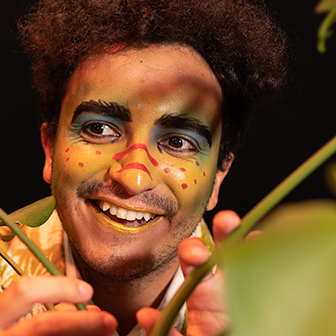


1603 Vienna. Duke Vincentio has skipped town and left Angelo (an authoritarian) to strictly enforce the repressive theocratic laws that have gone unenforced for decades. All houses of ill-repute have been ordered closed, and all fornication (pre, post, and non-marital sex) is now punishable by death.
A young man, Claudio, has his fiancé with child, and has been sentenced to die. At Claudio’s request, his friend Lucio persuades Claudio’s sister Isabella, a young nun, to beg Angelo for her brother’s pardon. Upon meeting Isabella, Angelo is overcome by lust for her, and offers to save Claudio’s life only if Isabella will give him her virginity. And there begins the major conflict of Shakespeare’s celebrated “problem” play: Measure For Measure.
This production, stripped down to its essential elements by a small ensemble, is fast and physical. Shakespeare’s tragicomic tale of justice, mercy, faith, sex and power resonates, here and now in the 21st century, just as it did there and then, at the turn of the 17th.
Shakespeare’s Measure For Measure is technically a comedy, but most contemporary audiences accurately find it dark, troubling, and problematic. It is bawdy at times, and also attempts to seriously address adult themes. There are frank and explicit depictions of violence, sexuality, prostitution, and sexual harassment.

Under the light of da mahina, lunas, workahs, lovers, amateur actors, and menehune cross paths to funny kine effect. As the paniolo Duke of Akaka Falls, Tee-Seus, prepares one pā‘ina with his bride-to-be, Hippie Leeta of Puna, their kanikapila stay interrupted by one uncle, Ege-Seus (who say his daughter Hernia gotta’ marry one guy he went choose for her, that Dummy, Treeus). Uncle says if Hernia refuses his choice, according to one old-fashion kine law that says men control women, she gotta’ jump over the falls as punishment. Worse yet, Hernia loves one nodda’ guy, Sanders, and one nodda’ girl (da odda’ girl’s friend, Hele On) stay in love wit that Dummy, Treeus!
Oh, also same time as all dat human kine drama, get menehune dramaz as well! Da menehune King and Queen stay fighting too, causing all kine chaos in nature.
Everyone stay meet in da woods, and everything get all jam up.
In dis production, I ask: what is our relationship to ‘āina? What is our relationship with those who went come before us? And when we tink of love, confusion, in da nahele, what do we tink of? Is it informed at all by kanaka maoli kine thoughts? I tink about how love is mysterious, strange, wonderful, hilarious, and sometimes dangerous when I read dis play. Da director, Sean-Joseph Takeo Kahāokalani Choo, stay proud for direct one play dat is in pidgin, his first language, one language dat stay worthy of respect and aloha as much as Billy Shakes’ lines, and just as potent for make poetic kine stuff, lidat!